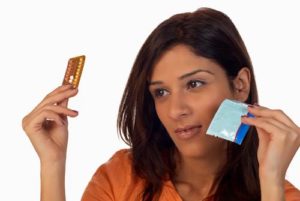Contraception & Pre-conception Advice
Sarah and the GP’s are able to offer advice and information on a variety of methods of contraception and give you advice if you are thinking of starting a family. If you would prefer you can also book a routine pre-bookable appointment with a doctor to discuss this. S ome of the methods of contraception we are able to offer within the practice are:
ome of the methods of contraception we are able to offer within the practice are:
- Depo injections – This is injected every 12 weeks by the nurse. The first injection is usually given within five days of your period starting. Once it has been injected the contraceptive effect cannot be reversed until the 12 weeks is up. Make sure that you keep your appointment for your next injection. If you are late going back for your next injection it may no longer be working and you may be at risk of getting pregnant.
- Coils – The coil is a small device that is put into a woman’s uterus by Dr Martin or the practice nurse. It is made from plastic and contains progestogen hormone, it works for five years before it needs replacing. It is more than 99% effective. This means that less than 1 women in 100 who use the coil will become pregnant each year. (Compare this to when no contraception is used. More than 80 in 100 sexually active women who do not use contraception become pregnant within one year.)
- Advantages: Once it is inserted you can forget about contraception for five years. It does not interfere with sex, periods usually get lighter, less painful and often stop. Fertility returns as soon as it is removed. The coil is often used as a treatment for heavy periods, even in women who do not actually need contraception. It is also used as a treatment for endometriosis and fibroids.
- How is it fitted: You will first need an appointment with Dr Martin or the practice nurse to make sure this form of contraception is suitable for you and to take swabs. The fitting is usually done towards the end of a period or shortly after. You will need to have a vaginal examination. The doctor will pass a small instrument into your uterus to check its size and position. An IUS is then fitted. You will be taught how to feel the threads of the IUD so you can check it is in place. It is best to check the threads regularly, for example, once a month just after a period. If it is fitted within seven days after the start of a period then it is immediately effective as a contraceptive. If it is fitted after the 7th day then you need to use other forms of contraception such as condoms for seven days.
- Follow up: Dr Martin or the practice nurse will want to check that there are no problems 6 weeks after fitting and thereafter once a year just to make sure it is still in place.
- Implants – the contraceptive implant is a small tube that is put under the skin. It contains a progestogen hormone. This is a tube 40 mm long and 2 mm wide (about the size of a hair grip). The progestogen hormone in the implant is released slowly into the bloodstream at a steady rate. The progestogen works mainly by stopping ovulation (the release of the egg from the ovary). It is more than 99% effective.
- Advantages: You do not have to remember to take a pill every day, you only have to think about contraception every three years, it does not interfere with sex, it can be used when breastfeeding, period pain is usually less than usual.
- How is it fitted: You will first need an appointment with Dr Martin or the practice nurse to make sure that this is an appropriate form of contraception for you. The implant is put in the inner side of the upper arm under the skin usually within five days of a period starting. (This ensures that you are not pregnant.) It is effective from then on. An injection of local anaesthetic is used to numb the skin. A small cut is made and the implant placed under the skin. The wound is dressed and will soon heal just like any other small cut. The area around the implant may be bruised and sore for a few days, but this soon goes.
Antenatal Services
Your care during pregnancy is led by the Midwives but in their absence you will be seen by a doctor. As soon as you have a positive pregnancy test you should make an appointment to see a Midwife at around 6 – 8 weeks pregnant (please let the reception staff know it is your first appointment as  you will need a longer appointment). We strongly urge you to do this as soon as possible to ensure that all the checks which are available to you are offered at the right time.
you will need a longer appointment). We strongly urge you to do this as soon as possible to ensure that all the checks which are available to you are offered at the right time.
Post-natal & Baby Clinic
After your baby is born, we will receive notification of this from the hospital. We then write to you with an invitation to come in for a post natal check at 6-8 weeks.
Young People & Confidentiality
Confidentiality is very important for young people, especially around issues of sexual health and contraception. The doctors and nurses need to abide by the law on these matters and follow what are known as the Fraser Guidelines, these state that advice and treatment can be given to someone under the age of 16 if the doctor or nurse are satisfied that:
- the young person will understand the professional’s advice;
- the young person cannot be persuaded to inform their parents;
- the young person is likely to begin, or to continue having, sexual intercourse with or without contraceptive treatment;
- unless the young person receives contraceptive treatment, their physical or mental health, or both, are likely to suffer;
- the young person’s best interests require them to receive contraceptive advice or treatment with or without parental consent.
Although these criteria specifically refer to contraception, the principles are deemed to apply to other treatments, including abortion.
Chlamydia Screening
- Chlamydia is the most common sexually transmitted infection in the UK
- It affects both men & women
- 1 in 10 people under 25 years old test positive for Chlamydia
- Most people with Chlamydia show no symptoms
- Chlamydia is easily treated
- Chlamydia may cause infertility problems if not treated
The Test: You can collect a test kit from the surgery or you can give a urine sample (male) or self-taken swab (female). Swindon’s Chlamydia Screening Office will contact you within 7-10 days if you do have Chlamydia. You can collect a self-test if you are aged 16 -25 years at the surgery or at any of the locations listed below:
- Swindon NHS Health Centre – 2nd Floor, 1 Islington Street, Swindon, SN1 2DQ
- Ashington Pharmacy, Ashington Way, Swindon, SN5 7XT
- or Order a self test kit online
For a home testing kit which you can return by post, you can go to:
- Ask at reception or
- The Clivey Project – John Moulton Hall, Penhill Drive, Swindon, SN2 5DU
- The Underground youth centre – Thamesdown Drive, SN25 4AN (next to Library foyer)
- Swindon College – North Star Avenue, Swindon, SN2 1DY
- New College – New College Drive, Swindon, SN3 1AH

